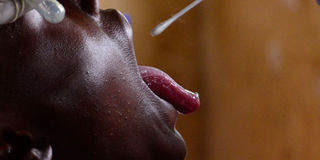Four recovered Covid-19 patients test positive

A health persoNnel takes swabs from a man for Covid-19 test recently. FILE PHOTO
What you need to know:
Dr Misaki Wayengera, the head of the scientific advisory committee to the Ministry of Health on Covid-19, told Daily Monitor yesterday that although the occurrence is not unique to Uganda, it is perplexing to scientists based on the short time it is occurring.
Scientists have revealed that four people, who recovered and were discharged from hospital following Covid-19 infection, have tested positive again.
The scientists say they are still investigating to find out whether this is being caused by re-infection or the test kits used to declare the said patients negative were faulty.
Dr Misaki Wayengera, the head of the scientific advisory committee to the Ministry of Health on Covid-19, told Daily Monitor yesterday that although the occurrence is not unique to Uganda, it is perplexing to scientists based on the short time it is occurring.
“Several cases like that [of recovered Covid-19 testing positive again] have been reported, there are around four cases right now. ….we don’t think the re-infection should occur after a very short time because they should still be having antibodies to fight off the infections,” he said.
Dr Wayengera said the exact reason why the patients are testing positive again cannot be established.
“We don’t want to rule out the fact that someone can get re-infected but we think the tests are probably picking up dead viruses. We saw something like this happening in South Korea,” he said.
“The test we use can pick up RNA (ribonucleic acid) from a dead virus. But even if someone has recovered, it takes time before the immune system removes virus RNA from the body,” he said, adding that testing someone again may show them still having the virus.
Theory
In viruses, RNA rather than DNA (deoxyribonucleic acid) carries the genetic information for the organism. RNA can survive for long in the body and it is what the machine tests to determine the presence of coronavirus.
Dr Bruce Kirenga, the head of Makerere Lung Institute who is also in the response team, said the re-infection is probably caused by shortage of antibodies. “Some of the Covid-19 patients who are exposed don’t make antibodies [against the virus]. There are many factors; some of them have immunosuppression from HIV and other things that affect the production of antibodies,” he said.
Dr Julius Lutwama, the deputy director of Uganda Virus Research Institute, said there are increasing reports of Covid-19 patients producing antibodies but the antibodies don’t last.
Person to person differences and the severity of the infection determine how much antibodies will be produced and the amount produced determine how long they last, according to Lutwama.
“The body fights and the way it fights is by producing antibodies, however, this antibody may not last. And what it means is that when the infection comes back you can get re-infected because you don’t have the immunity in your body,” he said.
Mr Emmanuel Ainebyoona, the senior spokesperson at the Ministry of Health, referred this reporter back to the scientists to find out more about the development.




